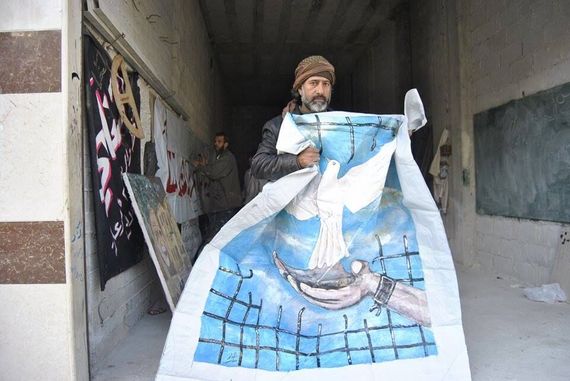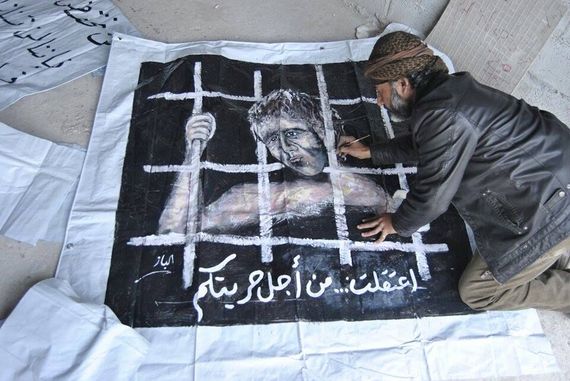About Through Their Voices serial stories:
Moaddamiyeh has been an early hotspot for anti-Assad demonstrations and the following government oppression. The town has endured the siege of the Assad regime since the end of 2012, and it is one of the towns hit by chemical weapons in August 2013. Despite all the violence, these activists believe in the principle of peaceful. And after five years of the Syrian revolution, their stories and experiences must be heard, their words reflect their struggles and hopes. Ten stories will be told through their voices.

Abu Numair is a video expert, cartoonist, and caricaturist who is currently working as an art instructor for the children under the siege of Moaddamiyeh. In the past five years, Abu Numair has not left the town where he is living with his wife and children. Before the Syrian revolution began he worked as a video technician for the Syrian Radio and TV broadcaster.
"When a demonstration took place in the middle of Damascus, I was in the scene with TV crew and we were filming a TV series. The situation was horrible, and the intelligence forces came and started beating and arresting demonstrators. And when they came to me they took the tape assuming that I might have recorded something unpleasant. I don't know how I managed to not say, 'Damn you and your president!' But I left the scene and went home to Moaddamiyeh where we eventually witnessed more demonstrations, in which I was involved. I decided not to go back to work and to Damascus because I knew that if I continue to see that kind of oppression committed in front of me I will not stand there merely watching it as I did the first time."
Every day since the Syrian revolution started Abu Numair has produced a new drawing and he has opened an archive of all his artwork and caricatures. In 2011, he used to help to create big banners for the demonstrations, yet his current drawings are mostly trying to reflect on the situation in Moaddamiyeh and the political situation in Syria. Living under the siege Abu Numair provides art workshops for the traumatized children of his town.
"The children here are really traumatized and tired. It's been five years for them. Some of them are only five years old and they've witnessed nothing but sorrow, blockade, and violence. The first time I asked the children to draw something, they were drawing tanks, missiles, blood and dead bodies. I tried to ask them to draw something colorful like a rose or a tree or cartoon characters. Some of them didn't even know what a rose or who Mickey Mouse was. They never watched TV! And they were mostly using dark colors, as they claimed they did not like brighter colors."
Abu Numair pointed out that the situation is so severe that his efforts can hardly account for it. Yet he has managed to regularly offer courses for approximately 90 children between the age 5 and 15. He keeps all the drawings, writes their names on them, and hopes to one day put them on display them in a gallery. Lacking most of the much-needed materials, Abu Numair assumes that only 15 percent of his students may improve psychologically.
"It's really hard to deal with the children in such a situation. At the end of the day, I'm not a psychiatrist, but I'm trying to do my best to help them feel better. I would actually need a much bigger staff and appropriate resources besides specialized psychiatrists. These kids were born and lived under bombings and starvation. I hate to say it, but they are like little monsters. They are not getting food, they are insecure all the time, and they feel they need to fight to get their food. The grow up seeing aids entering their besieged city, and they feel they have to fight in order to be first in the queue to get food. When I see them like that, knowing that there is hardly anything I can do about it, I just feel depressed and useless. My art is not able to feed their starving bodies or cure their wounded hearts."
Besides his work with the children, Abu Numair tries to assist awareness campaigns in which he paints graffiti on the walls, commenting on the current situation in Moadamiyeh. He also goes through town visiting people, trying to talk to them and provide some support for the families of detainees and martyrs. Abu Numair points out that these families have coped with a lot, but they could never cope with the loss of their dignity.
"We took part in this revolution because we wanted our dignity and now after all the losses and the horrors we went through they can't force us to lose part of our dignity. Starving is a true humiliation. We didn't spend five years struggling to finally find ourselves standing in a queue to get a food basket. We suffered a lot and we've lost a lot, we've paid a huge price to receive our dignity. People are living under immense pressure, having them fight for food. The regime uses starvation as a weapon."
Another crucial issue for Abu Numair is the problems with the Internet connection and other necessary communication tools in the city, as Moaddamiyeh has been cut off the regular connection system for almost four years.
"It's hard for us because we have no idea of what's going on outside the town. And with 'nothing' I really mean nothing. Which also means that people outside the besieged areas have no idea about what is going on here, about the fact that we have children starving. I really hope that everyone with a living conscious could follow up our news and think about the children and try to imagine their children in such a situation. The regime's media outlets are not telling the truth. Look for the truth, people! Support the truth! It's really unbelievable that this happening in 2016. The situation is extremely bad and the crossing points have been closed since the beginning of the year. This time, we don't want you to get us aid. Instead, we want the siege to break. Break the siege not only for the starving bodies but for the hearts of our children which are currently filled with darkness."
The story was originally published in German on WirMachenDas.Jetzt
